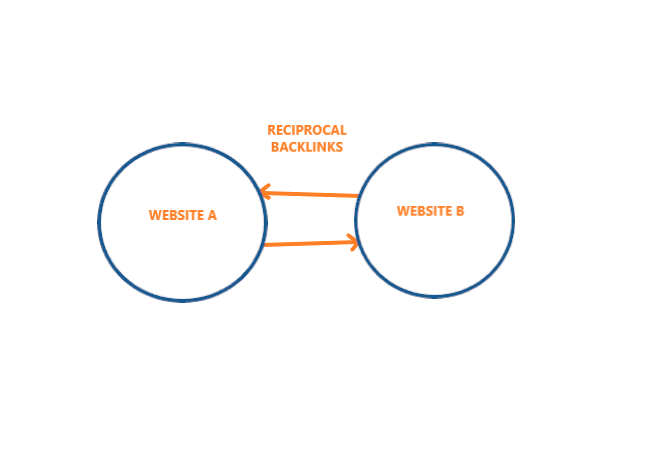On the other hand, a reciprocal link is a link where the owner of the web page that has its link on another site is willing to link to the particular website in return for the owner’s link being displayed on their page. These kinds of connections are very advantageous for various reasons. For example, suppose the owner of a blog that is attracting many visitors is willing to give their link to another person’s site so that the owner can get more views and thus be able to monetize their blog better. In that case, both the person who has the link on their blog and the other owner of the page will benefit from the situation.
Using reciprocal links may be considered more ethical than just giving someone else’s link without paying for it. But it is still essential to watch out when giving out links and make sure that you are using them in a way that does not violate any of the webmaster guidelines. Web admins who are constantly penalized for unethical link exchanges will find it very hard to continue with their businesses or sites. And this may mean that they will have to shut down their businesses or give up on using SEO services altogether. So make sure that you are using them more ethically and stay out of violation.
Difference Between Reciprocal Backlinks And Non-Reciprocal Backlink
Many web admins make the mistake of believing that the difference between a reciprocal and non-reciprocal backlink is purely a matter of the quality of the link. A backlink indeed has to be bought and sold like anything else. You can buy it from other web admins or even other websites (even web directories that cater specifically to this). You can also get it for free from other websites that you’ve linked to before or perhaps other people who you’ve linked to before. However, these two distinctions don’t apply to the quality of the backlinks.

- As far as the quality of the backlink, both kinds have their advantages and disadvantages. For example, you can get backlinks from just about any website on the Internet. If you buy them from another source, you have essentially “bought” the backlinks in question. This will make them much more valuable. In contrast, a reciprocal link isn’t a type of link where you can buy one and attach it to your website. This will typically involve a process where the other website owner will agree to allow you to use their resource box or include their link to your website in return.
- The real quality issue is something that relates to the quality of the backlinks. The problem is that the reciprocal backlink system is usually pretty straightforward and straightforward. You permit them to place your link on their website, and they’ll, in turn, allow you to do the same. With these backlinks, you have essentially purchased them from other people, and you are therefore not free to use them as you please. On the other hand, the backlinks on a non-relevant system can be pretty tricky to understand. They can also be harder to build. What happens is that when you make a backlink on a website, it means that you’re linking back to that particular website. This is different from simply building a backlink to your site. When you link back to another person’s site, you are essentially purchasing that link.
- So the bottom line is that reciprocal and non-relevance backlinks play differently depending upon which system you’re using. For those looking to build backlinks to their websites, the best thing to do is to build backlinks that are entirely unrelated to that website’s content. This will ensure that you’re building backlinks that are relevant to the target audience.
- For those looking to get backlinks for their sites, the critical difference between what are reciprocal links and non-relevant backlinks comes down to how many backlinks you’re allowing your website to have. Simply put, the more backlinks you qualify, the more reciprocal the whole system becomes. Put, if all you’re doing is adding and counting the reciprocal links, the search engines will take care of the rest. However, if you actively seek backlinks, the search engine ranking factor will shift towards your website because you are actively seeking out and building backlinks.
Are Reciprocal Backlinks And Non-Reciprocal Backlink Beneficial For Seo
For most internet marketers, the two concepts are often confused or kept apart. But what is essential is that they go hand in hand with each other, especially when it comes to getting the most traffic on your website. Although they are similar, an excellent way to determine if these are the best tools for you is to know precisely how they work and why. Different people use both backlinks and search engines to locate sites online through various means. But then, how does one stand out from the other?
Backlinks and search engines can be classified as two categories of internet marketing strategies that seek to build popularity on specific websites by linking to them. However, they have differences in their own set of criteria when deciding which site should be targeted. The search engines look for relevant sites that are closely related to the contents or topics being searched for by the users. Meanwhile, backlinks are also essential since they help link the site to other sites and increase its popularity in the cyber world. Both backlinks and search engines share a similar goal: the promotion of specific areas online.
Now that you know the difference between backlinks and search engines, the next thing you need to determine is whether it is worth it for you to use these two in your strategies. Reciprocal backlinks and non-reciprocal backlinks can prove to be helpful for you in your search engine optimization (SEO) efforts, but only if you do not target specific sites. Search engines tend to consider the number of links to a site rather than the site’s quality. Thus, if you want your backlinks and search engine positioning to be counted, you need only target your links to sites with related content.







